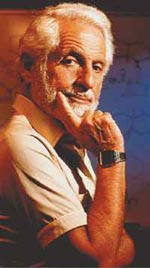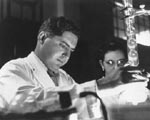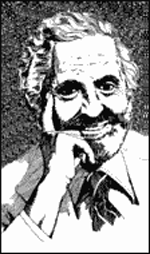

Shebang:
There must have been a moment; we aren't talking about a Eureka moment
but an enormous satisfaction
Djerassi:Of course, there is satisfaction, but it took some time
to appreciate what we had done.. Remember, as chemists we had a rationale
that this particular chemical ought to have progestational activity and
hopefully ought to be orally active. So we then sent it to a commercial
biology laboratory which was associated with the University of Wisconsin
because we were just a chemical operation in Mexico, we did not have a
biology laboratory. . They tested it for progestational activity in the
conventional animal at that time, rabbits. Well, lo and behold, they let
us know that this new steroid of ours was eight times as active as progesterone.
Now that was fantastic already. Because literally it meant that first
of all we had made now the most active progestational compound known in
- you know - in history, you could say.
Eureka!
Secondly, more exciting, it turned out that it was orally active. So that
was the Eureka part. To get confirmation from the biologists that what
we had was right what we had dreamed about. That if you make these
particular chemical changes in the steroid molecule and make a the new
one, it would be orally active and we had anwith the additional bonus
it would of being even more active than progesterone.
Pincus
Now the moment that happened then of course it was sent to all kinds of
different people, including to Gregory Pincus who was a biologist
at the Worcester Foundation for Experimental Biology in Shrewsbury, Massachusetts.
2000 miles away from where we were. He was a very well-known biologist
who was already at that time interested in the ovulation inhibitatory
properties of progesterone, and therefore he was very much involved with
the contraceptive aspects rather than the other, the therapeutic aspects
of it. Gregory Pincus was the one who is generally - and it's perfectly
appropriate -considered the Father of the Pill - if you permit us chemists
to be called the -
Shebang: Mothers.
Djerassi: Mothers. He and his team developed it biologically.
In those days this involved tests with rabbits and so on. And then the
midwife was John Rock, [a Catholic who was pro-birth control]
. He was a professor of obstetrics and gynecology at the Harvard Medical
School in Boston, and he did the first clinical experiments. He would
appropriately be considered by my metaphor to be the midwife. Now the
Eureka moment came with the validation of the hypothesis that we had been
able to synthesize an orally active steroid that retained the biological
activity of progesterone. We learned that we had achieved that within
5 or 6 weeks of our synthesis, around November 1951...
Shebang: What do you do then when you have a moment
like that, when you learn that you've succeeded like that? Do you shout,
yell 'Yes, yes, yes!'? What do you do?
Djerassi: Mmm - it is like almost all-successful research it is
very orgasmic - in many senses! It is an unbelievable high, but for a
very short space of time! [LAUGHTER]
Because, because the reality sets in. I mean you want to do it all again.
Frequently [LAUGHTER] and you can't just repeat that.
And secondly, you discover that there are going to be some problems, along
with the joy. To carry on with the sexual metaphor: My God did I get the
woman pregnant?
Shebang: What are the consequences?
Djerassi: What are the consequences? These really sink in only
after a while. Because to a chemist, again, the initial question would
be: So far, I only managed to make a few milligrams. But the question
arises, how do I make grams, how do I make kilograms and so on. And technically
this was a very complex problem. A very complex synthesis was required
considering the kind of chemistry that was done then. It was tough chemistry.
It still is.
And so I think we can pat ourselves on the back And we did get an awful
lot of recognition for it.
I'm talking about scientific recognition, the recognition that really
counts for a scientist.
Interestingly enough, there is something in the States called the National
Inventors' Hall of Fame. The very first invention of a drug they entered
there was our patent. We were put in there at the same time as Edison's
invention of electric light. The very first medical one was our patent
of the Pill.
And to give you another illustration: Recently, during the millennium
hoopla, the London Times had something on the thirty most important individuals
of the millennium. It starts with Newton and so on.
[Carl Djerassi is listed by the London Times as being
the 30th most important person of the millennium]
Shebang: Wow!
Djerassi:I am really the only living person in this list. But of
course in many respects it is totally ludicrous to have me there. You
don't have Mozart there. They have Shakespeare and -
Shebang: Luther, Copernicus, Magellan, you are
on this list with -
Djerassi: Einstein, Lenin
Shebang: Einstein, Lenin - [LAUGHTER]
Shebang: Pasteur, Darwin, Bonaparte...
Djerassi: But you see, the important point - this is what I want
to draw your attention to - you really have to divide these 30 people
by fields. It's ludicrous to put me into this group. In a certain sense,
it's even inappropriate to put Newton in there. About 15 of the 30 happen
to be scientists. And for the London Times who drew this up, numero uno
was Newton. But in a way, you see, if Newton had not been there, if he
had never lived, the laws of gravity and motion, the Principia would still
have been done, 1 year later, 5 years later, 20 years later. If Einstein
had not lived, someone else would have come up with Relativity. If Max
Planck had never lived you still would have had the quantum theory, no
question whatsoever, quantum mechanics and so on.
And if I had never lived, the oral contraceptive would have been developed
in a few months, a few years later. Because the fact is that the time
was right.
Art and Science
On the other hand, King Lear could never have been written. No-one other
than Shakespeare could have written Lear, no-one other than Dante could
have given the world the Divine Comedy. So having Shakespeare and Dante
on this list is of course correct because they really are amongst the
giants of the millennium. In a sense scientists are surrogates and it
is well worth the effort to help people to recognize this.
Shebang: In a previous issue of Shebang we have
an interview - [see Archives] - in which Lewis Wolpert says exactly the
same thing. You rerun history, the scientific discoveries would all be
made in due course, the chronology might be different, but the discoveries
would be made
Djerassi: Yes.
Shebang: You rerun the history of art, who knows
what would happen.
Djerassi: Absolutely.
Shebang: Next. Next. The National Medal of Technology
in 1991 for 'promoting new approaches to insect control'. So here you
are in another area.
Djerassi: Yes.
Shebang: Another world problem.
Djerassi: Another world problem. But here the Eureka concept is
more appropriate, and yet it's interesting that this work on insects was
very much primed by my early work on oral contraceptives.

